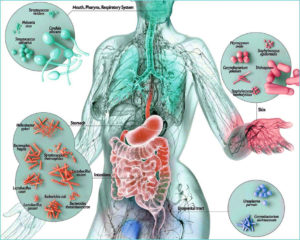
Over the past six years — promoting, illustrating and attempting to explain the importance of beneficial bacteria in soil for plant and ecosystem health — I’ve often compared this complex, underground network of microscopic exchange to the invaluable work of beneficial bacteria within the human digestive system. But today, with this world-wide crisis of COVID-19, I now turn back to the lessons we’ve learned from soil, in order to remind ourselves of the amazing network of beneficial bacteria – critical for our digestive health – and how we can strengthen their work and thereby our own internal immune system.
 Our producer partners, have clearly demonstrated how healthy, living soils – rich in beneficial micro-organisms and a highly diversified biome – create and protect healthy ecosystems. In the best of cases, we’ve seen production systems centered on living soils inoculating farmers’ fields from devastating disease such as —Hemileia vastatrix — the dreaded “coffee leaf-rust fungus“ and other threats to productivity such as drought, flooding and other pests and diseases caused by runaway climate change.
Our producer partners, have clearly demonstrated how healthy, living soils – rich in beneficial micro-organisms and a highly diversified biome – create and protect healthy ecosystems. In the best of cases, we’ve seen production systems centered on living soils inoculating farmers’ fields from devastating disease such as —Hemileia vastatrix — the dreaded “coffee leaf-rust fungus“ and other threats to productivity such as drought, flooding and other pests and diseases caused by runaway climate change.
Increasing the quantities of organic matter, strengthening the quality of compost with locally produced, beneficial bacteria and fungi — or “Efficient Micro-organisms” — spraying compost teas to cover vulnerable leaf surfaces, and mulching to support soil-life with stable humidity, are examples of regenerative, organic field practices that help strengthen the natural immune systems in farmers’ fields.
If we were to extrapolate and apply this approach in agriculture to our own human health, it would read something like this:
- Avoid food-borne toxins such as harmful pesticides, fungicides and herbicides; non-digestible artificial flavors and sweeteners; and emulsifiers found in most highly processed foods.
- And instead, eat a balanced and truly mineral and nutritionally rich diet, exercise your muscles, reduce stress and drink plenty of water… and dare we say, fair trade and organic coffee!
The first set weakens your natural immune system, while the second builds it up.
 Understanding this has never been more important than today, in the era of COVID-19. It’s not for nothing the age-old saying “Listen to your Gut.” Therein lies the foundation for so much of balanced, human health! According to reviewed scientific studies, summarized in a recent article by Medical News Today: “Looking after the health of the gut and maintaining the right balance of these microorganisms is vital for physical and mental health, immunity, and more.”
Understanding this has never been more important than today, in the era of COVID-19. It’s not for nothing the age-old saying “Listen to your Gut.” Therein lies the foundation for so much of balanced, human health! According to reviewed scientific studies, summarized in a recent article by Medical News Today: “Looking after the health of the gut and maintaining the right balance of these microorganisms is vital for physical and mental health, immunity, and more.”
 A healthy human is the walking, breathing host for some 100 trillion beneficial bacteria, yeasts, and viruses — also called the “gut microbiome” or “gut flora.”
A healthy human is the walking, breathing host for some 100 trillion beneficial bacteria, yeasts, and viruses — also called the “gut microbiome” or “gut flora.”
Of course, we should each continue to follow the recommended precautions, such as frequent hand-washing, avoid touching your face and maintaining social distancing, in order to slow the spread of the COVID-19 virus.
But there’s a lot we can do right now to strengthen our personal immune system and our community resiliency. Below is a summary compiled by Medical News Today suggesting how we can proactively strengthen our gut microbiome and overall resiliency to disease such as the pandemic situation we’re facing today.
- Eat probiotic and fermented foods, such as: fermented vegetables, kefir, kimchi, kombucha, miso, sauerkraut, tempeh, etc.
- Eat prebiotic (and ideally organic) fiber, or non-digestible carbohydrates to encourage beneficial bacteria to multiply in the gut, such as: asparagus, bananas, chicory, garlic, onions, and whole grains
- Eat less sugar and sweeteners. The authors of a study in animals suggest that the standard Western diet, high in sugar and fat, negatively affects the gut microbiome – and, can negatively influence the brain and general behavior.
- Reduce stress, including: psychological stress, environmental stress including extreme heat, cold, or noise, and sleep deprivation. Stress management techniques include deep breathing exercises, meditation and progressive muscle relaxation, physical exercise regularly, and regular sleep habits.
- Avoid taking antibiotics unnecessarily. Although it may be necessary to take antibiotics to combat some bacterial infections, overuse is a significant public health concern that can lead to antibiotic resistance. Antibiotics are damaging to the gut microbiota and immunity. Medical research has shown that even 6 months after their use, the gut still lacks several species of beneficial bacteria.
- Exercise regularly. This contributes to good heart health and weight loss or weight maintenance. But research also suggests that it also improves gut health.
- Getting enough sleep not only recharges your battery – it can also improve mood, cognition, and gut health. A 2014 study indicates that irregular sleep habits and disturbed sleep can have negative outcomes for the gut flora, which increases the risk of inflammatory conditions.
- Use different cleaning products. Just as antibiotics can disrupt the gut microbiota, so too can disinfectant cleaning products — which sterilize the environment of bacteria, pathogenic and beneficial alike! Research results that analyzed the gut flora of over 700 infants ages 3–4 months found that those who lived in homes where disinfectant cleaning products are used on a weekly basis, were twice as likely to have higher levels of Lachnospiraceae, associated with type 2 diabetes and obesity.
- Avoid smoking. In addition to the well documented impact on heart and lungs health and the increased risk of cancer, smoking also affects gut health. According to a 2018 review of research published over a 16-year period, smoking alters the intestinal flora by increasing potentially harmful microorganisms and decreasing the levels of beneficial ones.
- Eat a vegetable-rich diet. Studies have demonstrated a significant difference between the gut microbiomes of a vegetable-rich diet, and that of people who eat excessive quantities of meat (and in particular, avoid meat products coming off of confined animal feeding operations, or factory farms!).
Even if this era of COVID-19 requires that we take a physical distance from each other for the time being, it also demands we come together under a banner of common sense and solidarity.
At Coop Coffees we’re working hard to find creative ways to support our roaster members, as they scramble to adapt their businesses to an ever-changing landscape of social distancing, community lock-downs and / or a myriad of new cleansing procedures, in order to protect public health. But we must also remind ourselves that our producer partners across Latin America, Africa and Indonesia are significantly more vulnerable, with many living in highly marginalized regions and with scarce access to health care. The long-term relationships we’ve built with our producer partners are at the heart of Coop Coffees values and of our success as a business, and we are also exploring any opportunities to support them in this time of crisis and in the aftermath of COVID-19.
We truly are internalizing what it means to say, “We’re all in this together!”
COVID-19 illustrates to what extent we are interconnected, and it offers an opportunity to re-evaluate how our economic and social systems have been constructed. We need to stay strong in these trying times, because once we get through COVID-19 – we’re going to have a lot of work to do, re-organizing our societies based on more sustainable production systems and economies, and on healthier lifestyles for people and for the well-being of the planet!
Author: Monika Firl
March 22, 2020






















